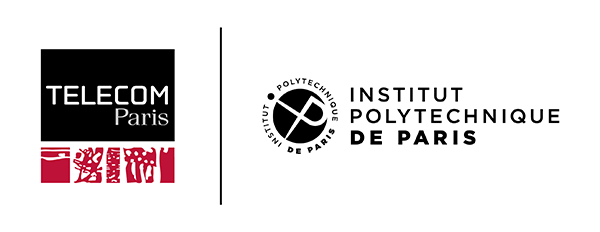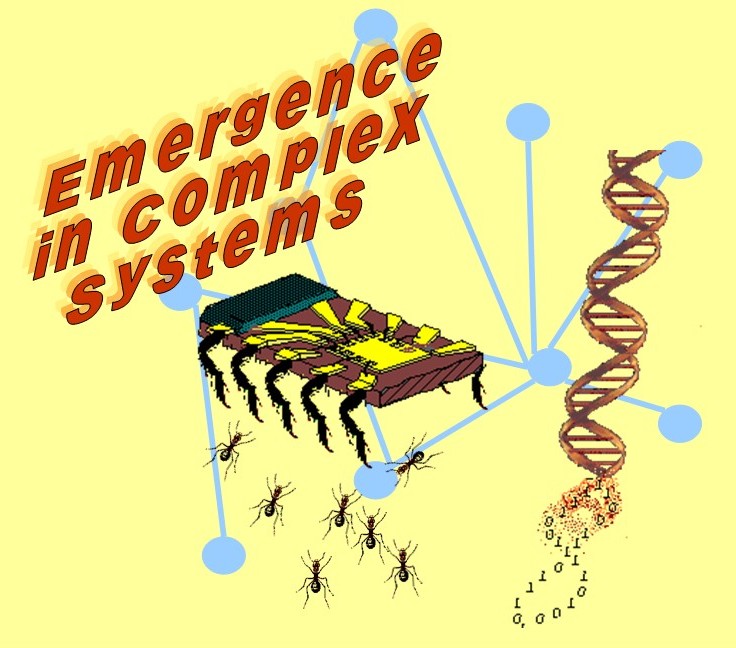
|
Telecom Paris
Dep. Informatique & Réseaux  J-L. Dessalles
← Home pageNovember 2024
J-L. Dessalles
← Home pageNovember 2024 |

 Module Athens TP-09
Emergence in Complex Systems
Module Athens TP-09
Emergence in Complex Systems
| Ada Diaconescu - Associate professor at Telecom-Paris |
| Jean-Louis Dessalles - Associate professor at Telecom-Paris |
| Samuel Reyd - PhD student at Telecom-Paris |
 ➜ [course Website]Insect colonies, evolving species, economic communities, social networks are complex systems. Complex systems are collective entities, composed of many similar agents, that show emerging behaviour. Though the interactions between agents are too complex to be described, their collective behaviour often obeys much simpler rules. Emergence occurs when a collectivity of elements or agents shows coherent organization instead of the kind of disorganization expected from the juxtaposition of their individual characteristics. The objective of this course is to describe some of the laws that control emergent behaviour and allow to predict it. The course will address conceptual issues, at the frontier between biology and engineering. Each afternoon consists in a lab work session in which students will get an intuitive and concrete approach to phenomena such as genetic algorithms, ant-based problem solving, collective decision, cultural emergence or sex ratio in social insects.An ant colony can find the shortest path in a complex environment;
➜ [course Website]Insect colonies, evolving species, economic communities, social networks are complex systems. Complex systems are collective entities, composed of many similar agents, that show emerging behaviour. Though the interactions between agents are too complex to be described, their collective behaviour often obeys much simpler rules. Emergence occurs when a collectivity of elements or agents shows coherent organization instead of the kind of disorganization expected from the juxtaposition of their individual characteristics. The objective of this course is to describe some of the laws that control emergent behaviour and allow to predict it. The course will address conceptual issues, at the frontier between biology and engineering. Each afternoon consists in a lab work session in which students will get an intuitive and concrete approach to phenomena such as genetic algorithms, ant-based problem solving, collective decision, cultural emergence or sex ratio in social insects.An ant colony can find the shortest path in a complex environment;
A species can solve complex adaptation problems;
Economic agents may spontaneously reach a locally optimal allocation of resources.
Simple individual acts, in each case, produce non-trivial results at the collective level. These observations constitute a rich source of inspiration for innovative engineering solutions, such as optimization using genetic algorithms, or message routing in telecom networks. The emergent behaviour of complex collective systems often goes against intuition. Its dynamics can be described through non-linear models that predict sudden transitions. Emergence is best apparent during those transitions. Its study consists in accounting for the appearance of collective patterns when individual, generally simple, behaviours are given as input.The main techniques studied in this module are:
- Genetic algorithms, in which a virtual population evolves and collectively adapts to a particular problem or to a new environment.
- Swarm intelligence, as a model of natural phenomena and as a class of collective algorithms. They are used to address problems in which adaptability and robustness are essential. We show how these different models can be applied to concrete problems, such as message routing in communication networks or optimal resource allocation.
- Emergence of phenomena like morphogenesis, segregation through symmetry breaking, patterns in cellular automata.
- Emergence of phenomena like Social Structures, Altruism, Cooperation, Social Signaling
Organization
Course exam
Students will be evaluated based on the following tasks:
- Answers during Lab work sessions
- Small open question quiz
- A 5 min. presentation of their personal project
- A short written description of their personal project (+ source files)
 ➜ [course Website]
➜ [course Website]